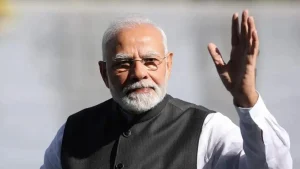Prime Minister Narendra Modi delivered a scathing critique of the Opposition disrupting Parliament, questioning why the government should intervene when opposition parties are metaphorically “digging their graves” through constant procedural disruptions. This pointed remark came during a significant NDA Parliamentary Party meeting where Modi addressed the persistent challenges posed by the Opposition disrupting Parliament during crucial legislative sessions.
The Prime Minister’s candid assessment reflects growing frustration within the ruling alliance regarding the systematic obstruction tactics employed by opposition parties, which have repeatedly stalled important legislative business and prevented meaningful parliamentary discourse.
In a unanimous resolution, the NDA Parliamentary Party praised the “unmatched courage” of the armed forces during Operation Sindoor and lauded PM Narendra Modi’s “unwavering resolve and resolute command” in addressing national security challenges. This military operation demonstrated India’s decisive response to terror activities and showcased the government’s commitment to protecting national interests.
Also Read: More on Opposition during Parliament? What did happen?
The NDA Parliamentary Party hailed the decisive response that delivered justice for the mothers and daughters of India, aptly named Operation Sindoor, emphasising the symbolic significance of the operation’s name and its connection to protecting Indian women’s dignity and security.
The Prime Minister’s reference to the Opposition disrupting Parliament and allowing them to continue “digging their graves” represents a calculated political strategy. By framing parliamentary disruptions as self-destructive behaviour, Modi positions the ruling party as the responsible governing force while highlighting opposition parties’ counterproductive tactics.
 This messaging resonates with voters who expect their elected representatives to engage in constructive parliamentary debate rather than resorting to disruptions that halt legislative progress. The comment suggests that the Opposition disrupting Parliament ultimately damages their own credibility and public standing.
This messaging resonates with voters who expect their elected representatives to engage in constructive parliamentary debate rather than resorting to disruptions that halt legislative progress. The comment suggests that the Opposition disrupting Parliament ultimately damages their own credibility and public standing.
The NDA Parliamentary Party voiced strong support for naming India’s military response after Sindoor (vermilion), stating that the cowardly terrorists removed sindoor from our women while our Armed Forces, through Operation Sindoor, avenged their cruelty and protected crores of Indians”. This symbolic naming convention demonstrates the government’s commitment to protecting Indian cultural values and responding decisively to threats against civilian populations.
The operation’s success has become a rallying point for the NDA alliance, showcasing effective leadership during national security crises and contrasting sharply with the Opposition disrupting Parliament through procedural objections rather than engaging in substantive policy discussions.
Recent parliamentary sessions have witnessed repeated instances of the Opposition disrupting Parliament, preventing the passage of crucial legislation and hampering democratic processes. Parliament did not function properly with Opposition parties disrupting the Lok Sabha over various demands, including discussions on electoral roll revisions, highlighting the extent of procedural obstruction.
The pattern of the Opposition disrupting Parliament has become increasingly problematic, as it prevents meaningful legislative work and undermines the institutional integrity of India’s democratic processes. Modi’s pointed remarks address this systemic issue while positioning the ruling party as committed to functional governance.
The NDA Parliamentary Party meeting demonstrated remarkable unity among coalition partners, with unanimous support for Modi’s leadership during challenging times. The resolution praising Operation Sindoor reflects confidence in the Prime Minister’s decision-making capabilities and strategic vision for national security.
This unified stance contrasts sharply with the Opposition disrupting Parliament through fragmented approaches and procedural tactics that fail to present coherent alternative policy frameworks. The NDA’s cohesive messaging on security issues strengthens its political positioning ahead of future electoral challenges.
The persistent pattern of the Opposition disrupting Parliament has significant implications for India’s legislative agenda, potentially delaying important reforms and policy implementations. Modi’s strategy of allowing opposition parties to continue their disruptive behaviour while highlighting its counterproductive nature may prove politically advantageous.


Modi’s comment about not stopping those “digging their graves” represents sophisticated political communication that serves multiple strategic purposes. It dismisses opposition tactics while positioning the ruling party as confident in its electoral prospects, suggesting that the Opposition disrupting Parliament ultimately benefits the NDA alliance.
This approach allows the government to appear above petty political squabbles while simultaneously criticising opposition behaviour. The strategy may resonate with voters frustrated by parliamentary dysfunction and seeking leaders who prioritise governance over political theatre.
The Prime Minister’s remarks signal a potential shift in the ruling party’s approach to managing the Opposition disrupting Parliament. Rather than investing significant energy in countering disruptions, the strategy may involve allowing opposition parties to expose their limitations through continued obstructionist behaviour.
Separately, for similar articles, you can refer to: Jaishankar on Trump
This calculated approach could reshape parliamentary dynamics, forcing opposition parties to reconsider their tactical approaches or risk further political marginalisation. The success of this strategy will depend on public perception of parliamentary disruptions and their impact on governance effectiveness.
The NDA Parliamentary Party’s unanimous support for Modi’s leadership during Operation Sindoor, combined with his pointed criticism of the Opposition disrupting Parliament, establishes a clear political narrative that emphasises competent governance, national security priorities, and democratic responsibility. This positioning may prove crucial in future political battles and electoral competitions.

